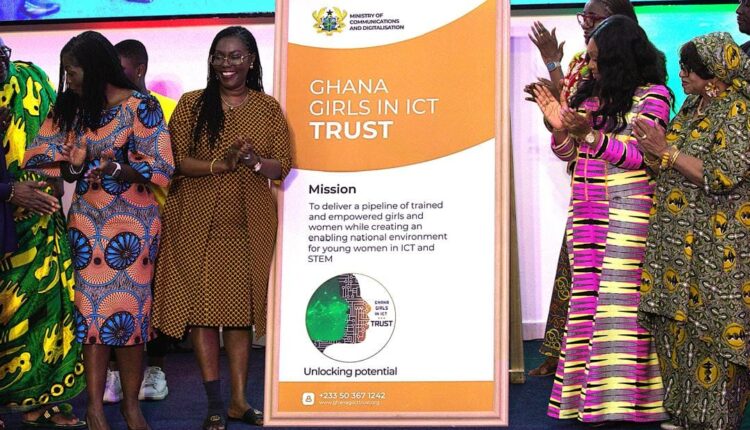Hon. Ursula Owusu-Ekuful, Minister responsible for Ghana’s Communications and Digitalisation has stated emphatically that she holds the Girls-In-ICT initiative implemented by the Akufo-Addo administration through her Ministry dear to her heart because it sees to train young ladies and bridge the gender digital divide.
“I have always had a special place in my heart for the Girls-in-ICT initiative which to me is a conscious effort to break barriers, dispel myths, and build a more welcoming digital future rather than a mere program. We need to make sure that girls are not left behind in a world where technology is changing every part of our lives. For them to prosper in this new digital era, we must give them equal access to opportunities, resources, and tools” she made it known speaking at the climax of the 2024 Girls-In-Ict Celebration held at Cedi Conference Center, University of Ghana, Legon on July 10, 2024.
She added, “The world is rapidly evolving into a digital age where technology is gradually influencing all aspects of our everyday lives. We can all attest to the fact that the areas of Science, Technology, Engineering, and Mathematics (STEM) have been largely dominated by our boys and this has created a gender digital divide that needs to be addressed as a matter of urgency. We need to introduce deliberate measures to bridge this digital divide to offer a level playing field for our young ladies to also become innovators and problem solvers of our world today and tomorrow.”
The Ablekuma West lawmaker further touted tremendous progress the initiative has brought into the lives of individuals especially young girls over the years adding that, what began as a modest one-day event has grown into a powerful initiative, impacting the lives of 13,981 young girls across all corners of the country.
She stated, “distinguished Ladies and Gentlemen, since the adoption and launch of the GIICT initiative in 2012, we have seen tremendous progress over the years. What began as a modest one day event has grown into a powerful initiative, impacting the lives of 13,981 young girls across Ghana. Today, we celebrate not only their achievements but also the journey that brought us here.
“When we initiated the Girls-in-ICT program, our aim as a Ministry was clear: to create an inclusive environment where girls could explore and excel in the field of information and communication technology. We recognized the transformative power of ICT and the critical need to ensure that girls are not left behind in this digital revolution. Over the years the Ministry has been successful at putting together various initiatives to ensure that this goal is met through the support of our sponsors.
“The International Telecommunication Union (ITU) since the introduction and launch of the initiative in 2011 has set various annual global themes. The global theme for 2024 is Leadership which is profoundly relevant as it empowers young girls to envision themselves as influential figures in the tech industry. By focusing on leadership, the theme challenges gender stereotypes, builds confidence, and encourages the development of crucial skills such as decision-making and strategic thinking. It highlights the importance of female role models and mentors, fostering an inclusive and diverse tech ecosystem that drives innovation.”
Trust Fund
In another development, the Girls in ICT Trust has been launched to ensure sustainable funding for the female students’ empowerment initiative, which has been championed for 12 years and previously operated based on donor support from benevolent organizations across the country.
“The Trust was born out of the desire of the Ministry to offer more girls more in-depth training, with age-appropriate content, and a developmental curriculum. We thought of the value that global interaction and best practice competitive content would add to their training. We also thought of the difference a long-term relationship with a role model working in ICT or STEM could make” Hon. Ursula stated during the launch of the Fund.
The Trust, she explained, would be a permanent resource, introducing girls to ICT in primary school, offering certifiable training opportunities in secondary school, and providing support and guidance to secure career opportunities in STEM at tertiary level.
“We will focus on promoting an enabling environment, working with corporate representatives, community leaders, gatekeepers, civil society, and educational resources to modify narratives, opportunities, and frameworks to be more supportive of females in STEM.
“A cohort of 32 Master trainers will tour the country annually to recruit, train, and support staff trainers, while 150 staff trainers will be trained annually to provide training to girls in schools. Fifty ICT hubs will be created or upgraded annually to offer female-friendly services, support, and guidance” she stated.


Comments are closed.